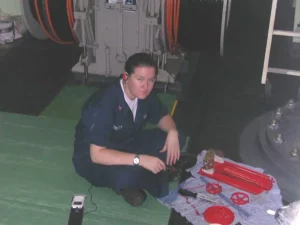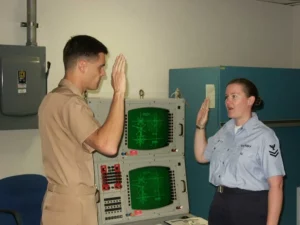by Jeni Brett
Every time I read a story on the news about a military woman who was harassed at her workplace, or assaulted while seeking care at Veterans Affairs, or killed before she could speak her truth, I tell my story.
I tell it often.
I don’t tell it for me.
The first time I was sexually assaulted in the Navy, I was 19 and newly married—still at my first training command. I was in the first of several schools training to be a sonar technician. Of the 12 people in my class, three of us were women—the highest ratio of women to men that I would see for the rest of my career.
When a classmate needed a babysitter, I jumped at the chance for some extra cash. My husband and I still lived separately in different barracks rooms as we tried to save for our first apartment. My classmate was a former Marine, already a petty officer, and I had met his wife. I felt safe. I went to his off-base apartment and watched his newborn daughter and toddler son while he took his wife out barhopping for her birthday. As they got ready to leave, my classmate asked me a bunch of questions about my sex life with my new husband. He made me feel uncomfortable. I should have seen those red flags, but his wife was there.
He came back from the bar alone, after a fight with his wife—raging drunk and looking for something to do with his rage.


He backed me into a corner, pulled out his penis, and grabbed my wrist. He pressed himself against me. He was drunk, and I was sober and now scared, so I shoved him as hard as I could. He lost enough balance that I pulled myself free, grabbed my purse, and ran.
I drove, shaking, the five minutes back to base, and I ran straight to my husband’s room. I sobbed my way through every single detail of what had happened. Jason listened quietly and then asked what I wanted to do. I told him that I wanted to report it, and so, early the next morning, he walked me to the duty security watchstander to make my report. I honestly thought that would be the end of it.
“Security” at our tiny training command in 1997 was one elderly civilian everyone called “Sarge,” and we didn’t have the same reporting options then as are available now. When I spoke to him, he told me he would handle it, that I shouldn’t worry, and to get back to class. So I sat in class for another week.
With my assailant.
Only a year into my Navy career, I learned that there was no safe place for a woman. Not with the men, and not with the other women.
Sarge was a man of his word. A week later, my would-be rapist went to the commanding officer’s mast, and every member of my class was called as a character witness for my classmate’s nonjudicial punishment hearing. They said I talked about sex in class. They said I swore too much and was unladylike. They said I wore my uniform too tightly, and that I had married my husband and therefore “gotten what I wanted out of the Navy.” They brought up my abortion and said it proved I was slutty.
I was the only woman in the room when the commanding officer dropped all charges “for lack of evidence.” He never asked me a single question.
First, I broke down and sobbed. And then I got angry. I marched to the legal officer’s desk. “How could you?” I screamed. “He was on trial, not me!” Someone finally dragged me away. To the lieutenant’s credit, he just sat there and took it.
The only female chief petty officer on base assigned me some extra military instruction (additional duties meant as a punishment) for my outburst. I answered her phone and vacuumed her office after working hours. Looking back now, I think she was scared for me, or worried about me, or felt somehow responsible—but her own internalized misogyny would not allow her to tell me so. She gave me a few “pep talks,” told me to buy bigger uniforms, and said that I needed to grow a thicker skin, and then she told me to make sure not to “make us look bad by getting pregnant.”
Only a year into my Navy career, I learned that there was no safe place for a woman. Not with the men, and not with the other women.
I decided to become the safe place that I so desperately needed, even if I helped just one person. And even if that one person was me.


My assailant completed school, quickly got orders, and transferred to his first command. I still had several more classes. I worked hard and did well, earning good grades despite the whispered insults and the sudden silences when I walked into a room. I tried to speak up once, to that female lady chief, but she told me, “Every woman in the Navy needs to decide whether to be a slut, a dyke, or a bitch. You need to pick.” I chose to ignore those rules—they were made by men, to give us just enough so we felt like we were almost equal.
I chose to be a woman, outside of the club, and to never, ever back down.
For most of my 20 years, though, this is the advice I was given. Military women join a well-established club, and they pay a price for admission. So often we internalize our own misogyny and try to act like “one of the boys.” Because senior women internalize that price, they may see sexism, sexual harassment, and even rape and know that it’s wrong or even dangerous, but to speak out is to have your boys’-club card revoked. This culture of complicity is compounded because women who follow the “rules” are rewarded. They get better evals, they get promoted faster, they get to stay in. And when they retire after 30 years, society further rewards them with seats on the boards and committees that make decisions for the next generation of military women.
It wasn’t easy to not listen to that advice. I spent the next 20 years standing up for women—both for myself and in support of anyone who needed it. On my first ship, my commander sent me to anger-management class because I “pushed too many boundaries.”
I had complained about porn being played on the mess decks and in the shops.
When I was a duty master-at-arms, every duty day without fail, a junior sailor waited for the inspector buck naked, his penis tucked between his legs. When I complained, I was told, “That’s just how he is.”


I carried a ruler with me to prove my hair bun was the right size, after continually having to prove it met regulation, until I finally gave up and just cut it all off. I memorized every regulation about gender, and then when I got pregnant on my way to my first shore command, every regulation about that, too. I knew the regulations for every uniform and grooming standard, male or female, and I kept my nails exactly one quarter inch longer than the tips of my fingers.
I knew that if I was going to push, I had to be perfect.
By the time I served on shore duty at the schoolhouse, I was a sonar technician second class petty officer (similar to a sergeant in the Army or Marine Corps). I was on permanent duty orders, but I was publicly berated by a lieutenant for sitting in on a staff training because he thought I was a student on hold—because of my obvious pregnancy. He refused to believe I was staff, so I just took the dressing-down, noted his name, and waited for my boss to come back. I got a formal apology and that lieutenant was moved to a job away from students.
So many students in my field were women then. It was the mid-/late 1990s—the first Gulf War had ended and the Navy had started building gender-integrated ships for the first time from the ground up. But not many women had risen to the senior enlisted ranks—statistically women are far more likely to only do one tour, and leave the service before they earn a higher rank—and none in that room to defend me.
I always thought of my actual job, the job that I was trained to do for the Navy, as my secondary occupation. My first goal? I worked to make sure that every woman finished her tour safely. I wish I had been more successful. One person cannot stop a whole culture that doesn’t value 20% of its workforce. I couldn’t be in more than one place. I still had to stand watch, lead my own division, and try to maintain my own mental health. I embedded myself wherever I could, introduced myself to young women just checking in, and walked the deckplates as often as I could, just being seen. When a woman chief rode the ship, even just for a short evolution, I would pull her aside and ask for wisdom, guidance, stories—another lifeline outside the command. A few sailors asked for my help and a few were directed to me. I did what I could to support them.
I was a one-stop shop for grooming regulations and pregnancy transfers.
By the time I made chief, the young women I mentored knew me as an ally, and the men we worked for knew me as a boat-rocker. I mentored sailors in other commands, and sometimes command master chiefs invited me to speak because their ships didn’t have a woman chief on board. (It’s a requirement, but not a priority.) Many of my brothers asked me for help with “fixing their problem sailors.” Overwhelmingly, the sailors were not the problem. It was their leadership. My brothers always got the help they needed, although it wasn’t always the help they wanted. Some of those young women I mentored are still in the Navy; a few still call me for advice. One of them still insists on calling me Momma Chief.
But I can count on one hand the men who made me feel valued and who treated every sailor equally. Only one of them still serves; most refused to be complicit and left the Navy.


In the days and weeks following Vanessa Guillen’s disappearance, in veterans’ spaces and in the comments sections of military sexual trauma survivors sharing their stories, there has been so much talk of how to fix these problems within the ranks. A common refrain has been that we need more “good women leaders” to support our young women. I firmly believe that the problem we have in the ranks is not a problem of gendered leadership, but rather a problem of leadership that ignores the toxic, insidious masculinity that has dominated leadership for decades. The behaviors that are rewarded are those which center and protect that patriarchal ideology of the “good old boy” club.
I never intended to retire after only 20 years. During those early chats with that chief at my first training command, I told her I was going to be the first female master chief petty officer of the Navy. I, too, thought all we needed were some strong women at the top.
I didn’t reach my goal.
The next assault I reported, by a chief on my own ship while we were on deployment, ended in retaliation and the end of my career. I fought it for another five years—and I had some wonderful support—but the damage was done. I would never be able to advance.
Still, I met my most important goal: I made it out of there intact, and now I can share my story. I am not without my flaws; there is likely a sailor reading this who was harmed by my own internalized misogyny, and for that I am deeply sorry. And I want her to know that I intend to keep doing better, and that I value her, and that I’m glad she’s still here.
About the Author
Editors Note
This article was originially published on The War Horse, an award-winning nonprofit news organization educating the public on military service. To learn more about the War Horse or to support their journalism, click here.
Make Your Voice Heard
Are you a Veteran who’s written about your own experiences as a woman in the military or Veteran community? We would love to help you share your story. Email hello@ladyvetusa.com or DM us on Facebook or Instagram to be considered for publication.
![]()
![]()


